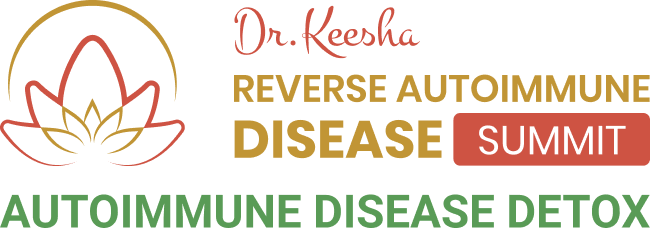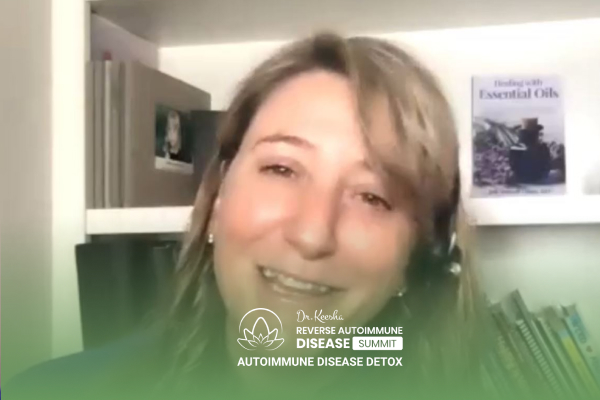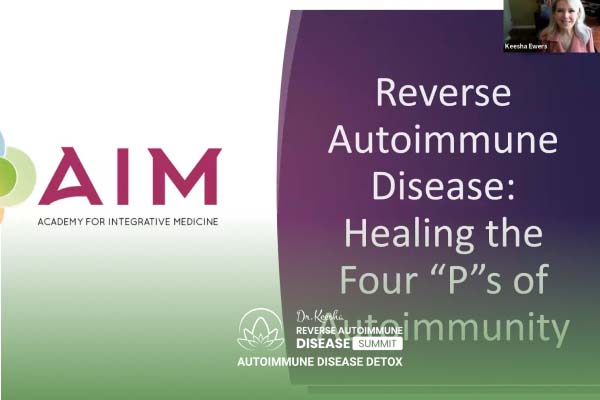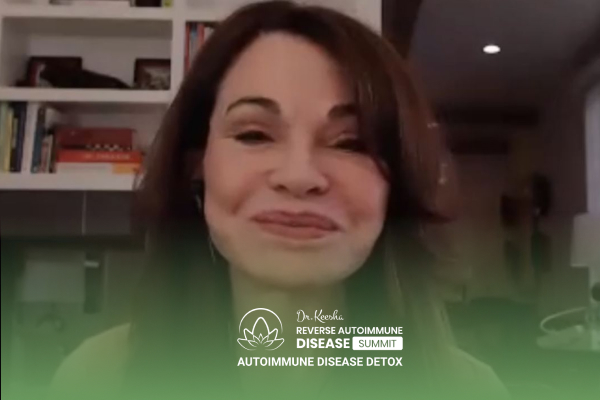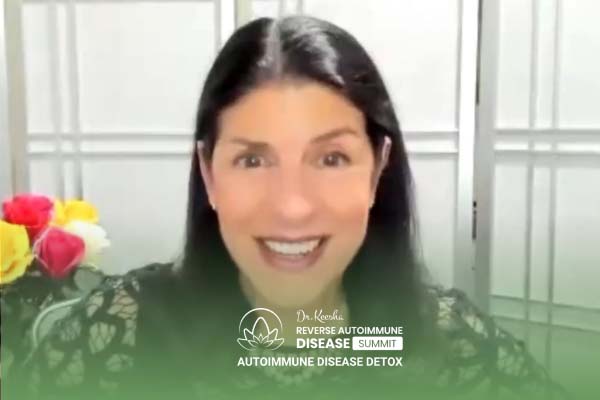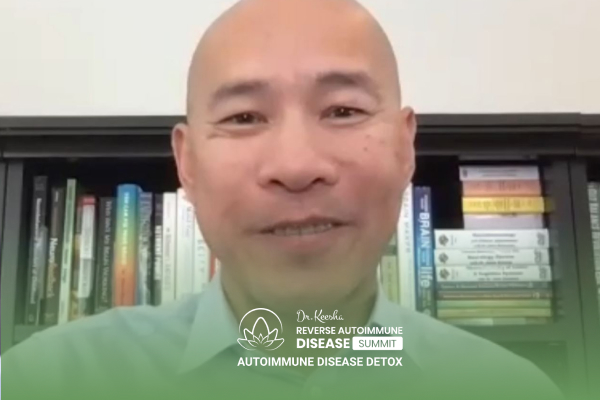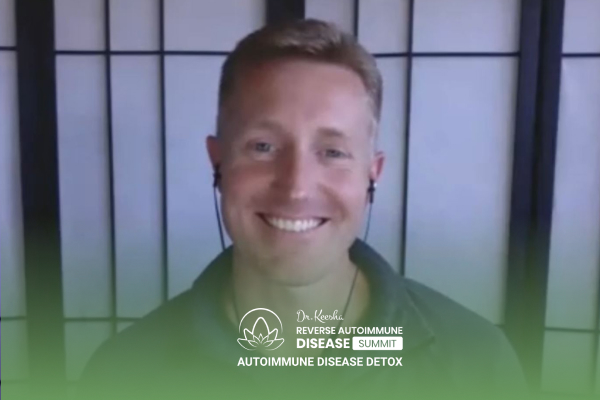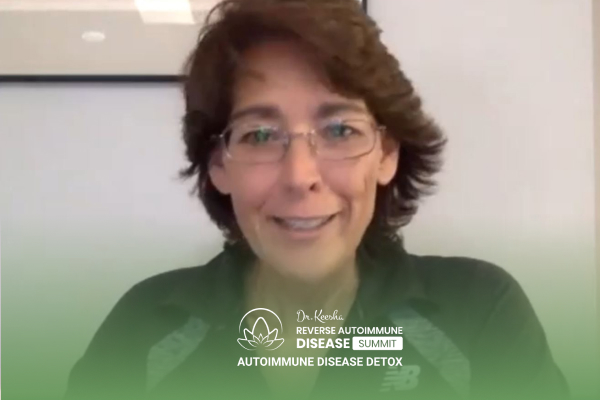Join the discussion below
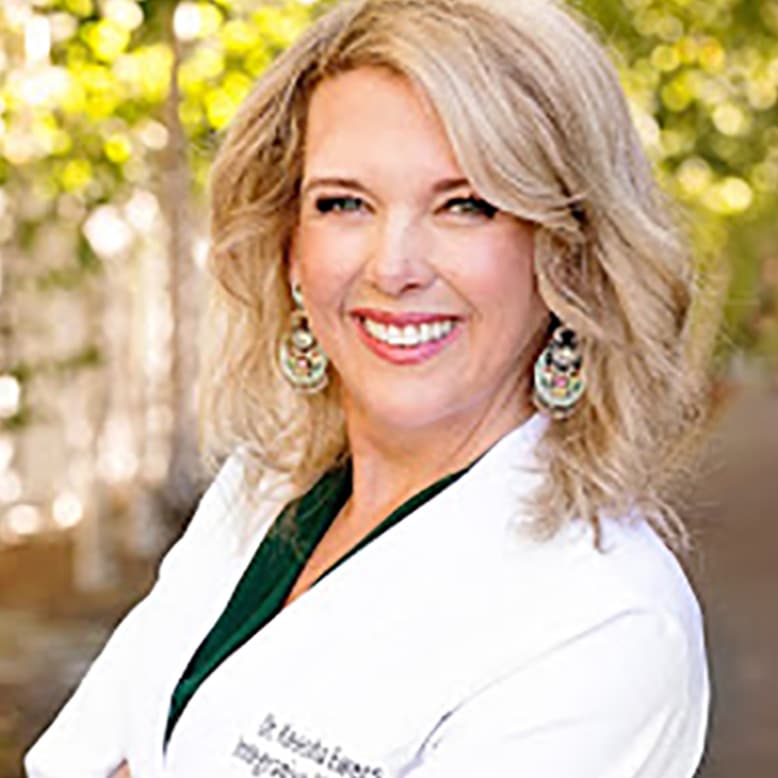
Keesha Ewers, PhD, ARNP-FNP-C, AAP, IFM-C
Dr. Keesha Ewers is an integrative medicine expert, Doctor of Sexology, Family Practice ARNP, Psychotherapist, herbalist, is board certified in functional medicine and Ayurvedic medicine, and is the founder and medical director of the Academy for Integrative Medicine Health Coach Certification Program. Dr. Keesha has been in the medical field... Read More

Jodi Sternoff Cohen is a bestselling author, award-winning journalist, functional practitioner and founder of Vibrant Blue Oils, where she has combined her training in nutritional therapy and aromatherapy to create unique proprietary blends of organic and wild-crafted essential oils. She has helped over 70,000 clients heal from brain-related challenges, including... Read More
- How the vagus nerve impacts your body’s ability to detox
- How to protect your body from “Vagus Nerve Toxicity”
- The most common symptoms to watch out for
Keesha Ewers, PhD, ARNP-FNP-C, AAP, IFM-C
Welcome back to the Reverse Auto-immune Disease Summit series everybody. I’m Dr. Keesha, and this is the fourth iteration of the Reverse Auto-immune Disease or RAD Summits. And we’re talking about auto-immune detox this time. And I am delighted to bring back my friend and colleague, Jodi Sternoff Cohen, who is a best-selling author, award-winning journalist, functional practitioner and founder of Vibrant Blue Oils, where she combined her training in nutritional therapy and aromatherapy to create unique proprietary blends of organic and wild-crafted essential oils. She’s helped over 70000 clients heal from brain related challenges including anxiety, insomnia and autoimmunity. She has a new book coming out, her first one, she and I, I think we released our first books kind of together, around the same time. ‘Cause we were doing the same, we had a similar coach, right? And so “Healing with Essential Oils” was her first book. And her second book is coming out in March. Actually, this is airing in April. I’m talking to Jodi in February. So when I say next month, it’s actually already out.
Jodi Cohen
It’s out.
Keesha Ewers, PhD, ARNP-FNP-C, AAP, IFM-C
It’s out. “Essential Oils to Boost the Brain and Heal the Body” was released on March 16th, 2021. Congratulations, Jodi.
Jodi Cohen
Thank you, thanks so much.
Keesha Ewers, PhD, ARNP-FNP-C, AAP, IFM-C
I usually will start any of these interviews with asking people about their own personal stories that brought them to where they’re at in this field, because I find them very compelling. And our life stories are what inform what we do with our, what Tibetan Buddhism would call your Dharma. And so I would really love to have you share that with our listeners.
Jodi Cohen
Yeah, I think with wounded healers life is like a roller coaster. You hit rock bottom, you claw your way out, then you hit rock bottom again. And so what first got me into nutrition was actually my son, Max. I had a really easy first child. Assumed I was a great mom, had a second one 22 months later who was not easy. And I took every parenting class, read every book, couldn’t quite figure out how to control the impulse control, the focus. We happened to be at a birthday party at the zoo, and Max was being really well behaved and my friend complimented me. And then they passed out like the snack, which happened to be a Ritz Cracker. And he Jekyll Hyded and took off. And after I like kind of reigned him back in, she said, my brother was on Ritalin his whole life. And it turned out he was just allergic to weird foods. You should take them to a nutritionist. So I thought I can do that, done everything else.
And our big cue with him used to be like, look at my nose. And he couldn’t. Took him to the nutritionist who took him off corn, soy and dairy. And the next day he could look at our nose. And I thought, this is so ridiculous. I’ve been banging my head against the wall and it’s food. I have to learn more. Went back and got a degree with nutrition. Was trying to help other moms, you know, with kind of squirmy sensory seeking kids. So I learned a technique called muscle testing which is great because the kid can be squirming all over the place, climbing your wall and you can still kind of ascertain what their health priority is and what to start them on.
And that came in handy for kind of my second dip which was my then husband was severely bipolar and it became obvious he was probably gonna die on my watch. So we moved him to a residential treatment facility where I knew he was safe and it wasn’t my job to keep him alive. At which point my adrenals said, great, we’re so exhausted. We’re gonna just stop working, which wasn’t convenient. Cause I was suddenly a single mom. The kids were five and seven. And everything I was trying, I knew the right remedies I should be taking. I was ingesting all the right supplements, nothing worked. A friend came over with a big box of essential oils and kind of gave me this aha moment of you have been so high cortisol for so long, I bet you’re chronically inflamed and your gut is toast. Why don’t you try other channels? Topical application means it goes through the skin, you know, that works from nicotine patches and hormone creams.
Like, give it a try. I thought, why not? I have to do something, nothing’s working. So using my muscle testing, I tried to figure out if there was anything in the box that would help my adrenals. Five oils came up, which surprised me because I normally get like one remedy. And then it occurred to me, oh, they’re liquid. I can combine them. So I tested each bottle and made my first blend literally in a shot glass because I didn’t know what I was doing. Put it on my low back and felt like me for the first time in two weeks. I was able to clean the house, do the laundry, put it away, go to the store, make their favorite meal. Like I kind of felt like I had myself back.
Keesha Ewers, PhD, ARNP-FNP-C, AAP, IFM-C
And you did all the wrong things. Oh, I have a little bit of energy. Let me go spend it and go into more debt, right? I just wanted to put that in, but it’s so freeing when you feel like yourself I guess. It’s like, oh finally.
Jodi Cohen
As parents, as mothers, as nurturers like our priority, especially when they’re little is really, you know, it’s like we’re always last on our to-do list.
Keesha Ewers, PhD, ARNP-FNP-C, AAP, IFM-C
Right, right. So that’s not the, you know, that’s not the end of your roller coaster, right? Because life does that, right?
Jodi Cohen
No, no.
Keesha Ewers, PhD, ARNP-FNP-C, AAP, IFM-C
Yeah, we do this, right? So you built your company.
Jodi Cohen
I built my company. I started it in 2012. And then August 27th, 2018, Max, you know, my raison d’etre, died in a car accident. He was 12. His dad was driving. There were other children in the car who also didn’t survive. And I knew enough from you about A scores. And I was looking at my 14 year old daughter and I thought, oh my God, her dad’s probably gonna go to prison. Her brother’s gone. My father was sick at that point. I’m like, I have to find a way to figure this out and survive so that I can show up for her and give her a fighting chance. And so it was highly motivated to figure out how one navigates grief. And yet I had no idea what I was going to do.
Keesha Ewers, PhD, ARNP-FNP-C, AAP, IFM-C
Yeah, no idea. And your journey through that, which is not over until the day you die.
Jodi Cohen
Yeah.
Keesha Ewers, PhD, ARNP-FNP-C, AAP, IFM-C
I mean, honestly, this is the way our big challenges are. They’re not done because this is part of what life brings. And when we’re talking about the essential oil blends that you created at the very beginning, right, to help with your adrenal fatigue, that you’re now using to support hundreds of thousands of other people on the planet, these are, you know, these have been tried and tested by you and your loved ones. And so that’s why I wanted you to start with your stories so that people would really understand, this way of coming upon solutions for pain, these are the authentic ways.
These are the ways that are tried, tested, proven. So along the way, as you’ve worked with other people and listened to their challenges that life has brought them, there are a lot of, those come in different packages, right? Challenges come in all sorts of different packages from death and loss to disease, to financial crisis, to I mean, name it, right? There are a whole bunch of different packages. And all of us have them. And so what are some of the health challenges that you’ve run across that you’ve started to organize into systems and things and created solutions for them that essential oils support? Because essential oils are not going to be good for the thing that my dad died from last week, which is a hemorrhagic brain bleed. You know? So like when we talk about, sometimes people will get very passionate about essential oils. And Jodi is a scientist, and so I love that she does this where she’s just like, if you’ve broken your arm, the essential oils will help you with the stress of that. But please go and get that fixed, right? Because I think it’s dangerous with a number of essential oil companies that sometimes people will write to me and say, will this oil solve this problem? And I say, no, that’s a red flag problem. You need to go to the emergency room. That’s not an email me. If you’re having chest pain, you need to go have an EKG.
Jodi Cohen
I can’t believe the number of times
Keesha Ewers, PhD, ARNP-FNP-C, AAP, IFM-C
Yeah, I know.
Jodi Cohen
Nah, I wouldn’t start with oils for that, like yeah. That’s nutrition, that’s–
Keesha Ewers, PhD, ARNP-FNP-C, AAP, IFM-C
Right. And oils are a tool to support that milleu. And so let’s talk about those health challenges where you think essential oils are really fantastic and shine.
Jodi Cohen
Yeah, and that’s really what I wrote the book for is kind of, I think people, we have a tendency to overcomplicate ourselves, right? We go and get all these tests and like, I’m Hashimoto’s. And I could decide that makes me really complicated. But at the root of most problems are kind of five imbalances that once you start to clean that up a lot of the symptoms disappear. You know, like sleep. If you’re not sleeping, of course you’re going to crave sugar. Of course you’re going to be tired during the day. Of course your focus might be off. Like let’s help you address sleep, and oils are great for that.
Keesha Ewers, PhD, ARNP-FNP-C, AAP, IFM-C
You mean caffeine is not the same to do the next day when you haven’t had enough sleep, just ignore your lack of sleep and have a cup of coffee and move on?
Jodi Cohen
Well, I am a Seattle girl so I do love my coffee. That is my one vice I will not get rid of. But no, you have other options, shockingly. We can actually unravel what’s going on. Is it trouble falling asleep because maybe your melatonin production isn’t as strong as it could be or your cortisol is too high and that throws off melatonin? Or are you waking up in the middle of the night with a blood sugar wake up, you know, and we can help your pancreas to get the insulin out so that the sugar gets back into your cells and out of your blood so you can go to sleep. Or are you waking up at 3:00 AM and you’re wide awake, your liver needs help. Like there are different reasons that your sleep is disrupted. And oils are great for sleep. Oils really work naturally with sleep problems. Stress, and this is actually the solution that was kind of a surprising solution. But, before Max died when people would say, oh, you’re so stressed.
And I used to think that meant changing my life. And you know, you have four kids. I had two, I had a business, I was uber volunteer. I didn’t really see a way to kind of change my external circumstance. And that made me feel more anxious and overwhelmed. And what I realized kind of through this is that you don’t need to change your external circumstance. You can change your internal response. And it’s that kind of shifting gears into the safety, parasympathetic branch of your nervous system that allows you to, you know, look at, an example I use is sometimes we’re stuck in traffic and someone cuts us off and we’re fine with it. Whatever, maybe they’re in a hurry, who cares.
The next day the exact same thing happens and four letter words are tumbling out of your mouth. And the only variable in that situation is you and how resilient you are in the moment. Or we’re running out the door and our kid needs something, sometimes we’re like, oh, I’m going to be late. And you like, you try to kind of fight it. And it just makes it worse, often ending in tears from your child. Or you say, all right, I guess I’m going to be late. And you lean in, what is it you need? And all of a sudden it’s like nothing. They just want to tell you something. They had a quick question. It’s all good. So the key to kind of managing, I think, your internal resilience is helping to shift out of the nervous, your autonomic nervous system controls your automatic functions, your breathing, your heart rate, your digestion, your detoxification.
When it thinks it’s in danger it kind of prioritizes survival. So it releases certain chemicals and things like that to keep you alive. And it down-regulates everything that’s not critical to immediate survival. And so when you’re in that danger state which is the sympathetic branch of your nervous system everything feels like a fire alarm and you’re constantly on edge and overwhelmed and anxious. When you’re in the parasympathetic state everything feels easy. You feel safe. It’s far more relaxing. The kind of on-off switch between these two states is your vagus nerve, the longest nerve in your body that most people have never heard of. Cranial nerve number 10 starts in the back of the head, splits, is most accessible here behind the ear lobe, and then kind of enervates the throat, the lungs, the heart, all of the organs of digestion.
This is when you feel better at the end of a yoga class, savasana, it’s because through deep breathing and the poses you have activated the vagus nerve, you have stimulated parasympathetic response. The savasana feeling is parasympathetic. It is most accessible behind this ear lobe. And there was a lot of research, there were like electrical implants, pacemaker like devices that were implanted here and the FDA has approved them for migraines, depression, epilepsy. What I realized with oils and reflex points is that you can use a stimulatory blend of oils. You know, oils, when you combine them, they do different things. In order to use them like an acupuncture needle they need to get into the skin quickly. But clove gets in in like 20 minutes because its molecules are a little bit thicker. Lime gets in really quickly. When you combine those two oils you can use them to stimulate this point. It’s like the electrical stimulus without surgery. It basically helps you shift into parasympathetic. And you’re like, oh. It just kind of, it’s like, okay, I can handle this. Like, you just show up as your best self.
Keesha Ewers, PhD, ARNP-FNP-C, AAP, IFM-C
So you were going through five.
Jodi Cohen
Five, yes.
Keesha Ewers, PhD, ARNP-FNP-C, AAP, IFM-C
Let me have you finish the five and then we’ll come back.
Jodi Cohen
Okay. The other three are drainage, basically making sure the garbage leaves your body and then energy, which includes both circulation and kind of the hypothalamus pituitary access. And then immune support and immune modulation and inflammatory control.
Keesha Ewers, PhD, ARNP-FNP-C, AAP, IFM-C
So we’ve spent a great deal of time on stress and sleep because obviously research shows us that your immune system is impacted. So the last one that you just talked about, inflammation and immunity are impacted if you’re sending a lot of cortisol out into your system chronically. You’re not meant to feel like you have a lion on your tail in perpetuity. The zebra will either die or it will get to safety. And there’s not this sort of like forever racing. It just isn’t possible. And yet humans tend to try to do the forever race, right? We have all kinds of things like energy drinks. And I was joking about coffee, but you know, things that stimulate us to try and keep us running, right? But the thing that you mentioned that I want to come back to that I find really important, and when I’m teaching for the Institute for Functional Medicine I’m teaching other doctors about adrenals, I always stand on stage and I say this.
Do not tell your patients to reduce their stress. And what I say next is, that is stupid. You know? And because if you keep saying that, reduce your stress, and here you have somebody that’s in your office in front of you who has a special needs child or is caregiving an elderly, right, parent, or has a job that they love but it’s very stressful or they’re working on their marriage or they just went through a death of some kind, you know, like, they’re not reducing their stress.
That’s that’s really ridiculous to say. And then what you’re doing is you’re putting the onus on the person in your office saying that you’re responsible for the amount of stress that’s in your life, which is accurate. But we have a pandemic globally right now, there’s global stress, right? And so this thing that you just said is so important and I really wanted to come back to it because this is part of the auto-immune detoxification that I’m referring to when I talk about detoxifying your physical body, your energy body, your emotional body, your mental body, and your spiritual body is changing the relationship you have with your stress, right? The relationship you have.
So Jodi and I both own our own companies. And every single day I wake up and I could be stressed about being the owner of my own company. The buck stops here quite literally. Or I can say, my gosh, I am so grateful that I get to do this work in the world. And it doesn’t change the fact that I’m responsible for everything that happens in my company. It changes my relationship to it from gratitude and appreciation, you know, which is going to be health promoting. Or I can go into, and be stressful about every little minute thing that happens as things change in the world. So that, I think, is really important. And oils can help bridge that moment for you but they can’t do it for you.
Jodi Cohen
Yeah, it’s like biking with the wind at your back going downhill, as opposed to uphill into the wind in the rain. It just, it makes it easier. You still need to pedal, right? But it’s just a more pleasant experience.
Keesha Ewers, PhD, ARNP-FNP-C, AAP, IFM-C
I really love that. And the words you used are showing up as your best self. And so what you’re doing is you’re calming things enough that now you can do your own awareness work which can only be done by you. And I think this is an important distinction because in our culture, I don’t know how you were raised, Jodi, but you know that, the idea that we’re all snowflakes and we can all be anything we want and we can all, there’s a piece in there that’s missing of, oh, the world does bring you challenges that sometimes they’re going to feel like they’re out of your purview to be able to manage. And you’re going to have to go find a mentor and learn a new skill. And you’re going to have to integrate that skill. This is Joseph Campbell’s hero’s journey. And I did not learn that in elementary school.
Jodi Cohen
No, I had a lot of perfectionist programming. And that was the other thing is just accepting that mistakes happen. It was not on my bucket list to have my child die at 12 years old. And so you have to kind of look at the world and say, I guess I will never be able to show up perfect or pretend to be perfect again. So how do I show up broken and just say like, mistakes happen and life still goes on?
Keesha Ewers, PhD, ARNP-FNP-C, AAP, IFM-C
And one way of doing that is accessing your beautiful vagus nerve here with oils that will help you do the showing up process. And so that’s, I mean, I just think that doing that, like what can I expect from oils? And then what do I need to expect from myself as the next step is what I was pointing to. So how is the vagus nerve involved in detoxification processes?
Jodi Cohen
Yeah, it’s really interesting. So when you’re in survival mode your priority is either fighting or fleeing, right? So all of the blood is routed towards the arms and the limbs and away from the liver, the gallbladder, the gut, the intestines, that whole detoxification pathway. You know, and this is true for digestion too. When you’re kind of eating, you know, when you’re throwing sandwiches to your kids in the back of the minivan on the way to soccer practice, that’s stressful, you know? Your blood is not being routed to your organs of digestion. So no matter, you know, if you made the most nutritious kale concoction they’re not actually assimilating it.
Keesha Ewers, PhD, ARNP-FNP-C, AAP, IFM-C
Right. I just had a visual, I got a ticket on the Mackinac Bridge in Michigan one time, throwing my kids food in the back seat on a cross country road trip, and a cop pulled me over and I never did it again. I was very, very grateful for that police officer.
Jodi Cohen
Back before COVID, soccer practice was always, like, at the most inconvenient time. And you know Seattle traffic, you had to leave at like 4:00 to get there by 5:00.
Keesha Ewers, PhD, ARNP-FNP-C, AAP, IFM-C
Right, right. So when we’re talking about vagus nerve and detoxification, you know, one of the five that we were, that you were talking about as far as root causes is drainage. And the lymphatic system is in here too. And so if your lymphatic system isn’t draining and your liver’s not detoxifying and your kidneys can’t get rid of ammonia properly and your skin isn’t sweating very much, releasing, you know, detoxification because your adrenals are tired and your adrenals are in charge of that. Then what?
Jodi Cohen
Yeah, then you’re, it’s like Sisyphus. Your poor liver is processing these livers, they’re not actually leaving the body so they get reabsorbed and it has to do more work and it gets exhausted. So that’s what’s really interesting. The more you can shepherd the toxins out of the body, ’cause toxins that stay in the body get kind of recirculated or they, you know, get stored in fat or they’re triggering the immune system which is causing more inflammation. I actually think this is one of the biggest underlying root causes especially of auto-immunity, definitely with my thyroid issue, is kind of the unresolved toxins.
So the more we can support every step of the way, you know, helping the cells be in the parasympathetic state so they release the toxins, helping the lymph actually drain, you know, down to the blood. And oils are great for that. Making sure that the liver has more vitality and energy, making sure that the bile duct that goes from the liver to the gallbladder isn’t congested, and making sure the bile flows freely, making sure that the gut, there’s motility and things are moving and actually leaving the body. Like, that’s really, if people get nothing else out of this talk, you know, switching on the parasympathetic state and helping to shepherd the toxins out of the body, that’s what oils are amazing for. And those two things alone will make a very big impact in your health and your autoimmune condition.
Keesha Ewers, PhD, ARNP-FNP-C, AAP, IFM-C
I do genetic testing on 100% of my patients. Most of them come to me because of auto-immunity or they have undiagnosed auto-immunity. And what I’ve found in all of them, and I do on genetics other people that come and find me too that don’t have autoimmune disease. And I noticed this isn’t true for them. Is that there’s a mismatch between phase one and phase two detoxification genetically. And so when phase one is really efficient and phase two is very, very sluggish, then after the enzyme pathway chews up your fat soluble toxin, it’s trying to make it into water-soluble so your body can hose it out through all the water pathways that we just talked about, then it recycles over and over again. I think this is one of the major causes of fatty liver disease.
There is so much non-alcoholic fatty liver disease in our country, and it goes under the radar all the time. Because unless those liver enzymes have bumped, no one’s catching it. But fatty liver is a spectrum. And so when people are having trouble, like if they get put on bio-identical hormones in my practice and they start gaining weight immediately, guess what I know? Their liver has that mismatch, they probably have fatty liver. And then we need to actually be shepherding toxins out of the system and getting that detoxification system more optimized before it has to deal with yet another thing. Livers hate hormones. They do not like hormones. And so it’s always a big red flag for me like, oh, you just gained five pounds in a week.
Good to know. This is what we’re going to do next. That’s not a bad thing, it just means that your body’s giving us information that you are not getting rid of things the way that you are supposed to and we need to optimize that better. So I think that this is a really important subject that we’re talking about because when those toxins are being recycled and stored and your body’s struggling to get rid of them, when we’re using oils we’re actually, I think about the lymphatic system. It drains at night and I always think about it as little dump trucks that are coming through, garbage trucks, and your cells have put little garbage sacks on the outside of the cell membrane for pickup at night. And now here come your little lymphatic garbage trucks picking up the garbage sacks and pulling them out. Well, if you’ve ever seen pictures of if there’s a garbage strike, have you ever seen San Francisco when they did that, right?
Jodi Cohen
Well, I lived in New York in the summer. The smell will be with me forever, but yes.
Keesha Ewers, PhD, ARNP-FNP-C, AAP, IFM-C
Yes, yes! Or going to a third world country like Cairo, Egypt, or Delhi, India, you know, and no one’s picking up the trash and removing it. There’s vermin, right? And in our case, the vermin is going to happen in the microbiota and our digestive tract. And all this starts to impact the immune system and your inflammatory response. And this is, if we can think about the essential oils being the little helpers that let the garbage trucks start doing their job, I love the word shepherding. It’s perfect. It’s just like, okay, here we are. We’re going to help. We’re going to make sure this is happening. We’re not going to let this pileup happen, right? Then the essential oils can really become powerful. They’re not the only solution but they’re the ones that are making your system do its jobs efficiently, because that’s really what you want. You don’t want dependency. You want your body to do its own job.
Jodi Cohen
Yeah, and that’s, I mean, that’s the beauty of plants, all plants. Plants that you eat, plants that you interact with in nature, plants that, you know, are concentrated into oils that you put on the body. They really help us return to balance. And that’s really what we want is to get back into remission and to balance so that we, you know, obviously we’re not going to go out and have a gluten party, but for the most part we don’t need to work as hard to make our system work in a healthy way.
Keesha Ewers, PhD, ARNP-FNP-C, AAP, IFM-C
I’m going to ask you a question that I just realized some people that are listening and viewing this might have. We have a great deal of chemical sensitivity these days, a lot of canaries in the coal mine are auto-immune patients. And plants have anti-nutrients in them so that predators won’t eat them, right, called histamines or oxalates, or, you know, tyramine as it ages, like, all of these things are produced inside of plant life. And now we have a lot of people that are having mast cell activation problems or having histamine issues. And so what do you, there’s a way that you can actually test things to make sure that you’re going to tolerate it. Do you want to teach people how to do that? With the oils?
Jodi Cohen
Yeah, I mean, the way I do it with oils is very slowly and very gently. If you’re averse to smell I don’t even recommend smelling it. I have actually a whole foot chart in the book but I just say it to put the smallest amount on the bottom of the foot. And see, ’cause a lot of times if you’re having mast cell activation that can relate to the vagus nerve. There’s this whole philosophy, speaking of drainage, so many of the pathogens that enter our system are living in the mouth. Either from metal amalgams that are offgassing, cavitations, root canals, or just pathogens in the gums. And they drain along the jaw, along the trigeminal nerve. And then they intersect with the vagus nerve. And if your lymph is congested in the neck then they can sit too long and get uptaken into the nerve and cause kind of a minor underlying infection that, what is his name, Tufts researcher Michael van Ekler calls vagus nerve infection hypothesis.
And that can kind of trigger the cell danger response. And so your cell always is kind of inflaming, causing pain, causing chemical sensitivities, causing fatigue. So there’s a correlation with fibromyalgia, chronic fatigue syndrome, and multi-chemical sensitivity. So one thing that really helps is to kind of help people shift into the parasympathetic state. Understandably, this point behind your ear is kind of in smelling range. So if someone has a sensitivity to that I tell them there’s a very specific vagus nerve point, super detailed in the book. And I go through it in videos so that no one can get it wrong. But that’s a good point. And then also to kind of calm the histamine reaction blue tansy essential oil is a really great one for kind of modulating the histamine response. Again, for some reason most people do not react to that smell.
We have it in a blend called histamine balance. But for any sensitivity, I would say just start by testing the smallest drop on the bottom of the foot, you know, and see how you go and then build from there. And with that population, to your point, we often encounter, once their body starts kind of shifting into parasympathetic they are so ready to dump toxins. It’s like, at the end of a long hike when you’ve been carrying a 30 pound backpack, you can not wait to take it off your back. The body’s like, yay. But if your drainage is congested, it doesn’t go well. So for that population I really advise doing everything you can to kind of open up your lymph. You do so much great information about rebranding, dry brushing, castor oil, you know, they’re essential oils you can use for lymph. So, just, I say go slowly. And if any symptom occurs, like, pause and really make sure that the drainage is open
Keesha Ewers, PhD, ARNP-FNP-C, AAP, IFM-C
That’s really, really important advice, what you just gave. And the other piece around that is if you’re like this all the time, you know, in hypervigilant mode mentally. If, I’ve noticed with mast cell activation, there’s a lot of hyper-vigilance, right, in the mind. And so if things do get to a point where they’re not going so well as Jodi said, where, you know, the lymphatic system is backed up and it wants to just go, psh, and you get a swamp of your symptoms again, the most important thing that I tell my patients with mast cell activation is not to react to that like, oh no, this isn’t working, nothing’s going to work.
I’m never going to get better. I’m going to die. Like, those survival things come up again, right? And now this and this match. And so again, using, you know, some parasympathetic oil blend from Jodi with Vibrant Blue oils, which is a beautiful blend to just, like, help, again, bridge that space of in this moment my body is challenged, I’m not dying, I’m alive, you know? And just like reiterating that every breath, every moment, I am here, I’m alive. My body’s giving me some data. I’m going too fast. Let me slow down my breath work. Let me slow down my mental work. Let me slow everything down and just be with the body and support it. And so, it’s like, it’s okay body, right? I’m right here with you. It’s when that anxiety ramps up again that things go to the races, right?
Jodi Cohen
Actually, there’s a great trick that I share in the book for anxiety. ‘Cause it’s so funny how you don’t realize kind of your foibles until your coping mechanisms get taken away. So I’m a lifelong anxiety girl. And in many ways it served me well because it made me very type A and very achievement oriented. But then when Max died and COVID, it’s like, you know, I can’t go exercise, I can’t go see my friends. All of the things, I can’t go to a movie to distract myself. So our colleague Titus Chiu, who studies functional neurology which is a branch of chiropractic that’s really looking at the different hemispheres and regions of the brain and how to balance them, he taught me that an anxiety attack is the right frontal lobe, so the right forehead, that’s overactive. So the way you calm that is you stimulate the left frontal lobe to balance the two hemispheres.
Your nose, your olfactory channel goes directly to the left forehead. So literally just taking the right thumb, plugging the right nostril, smelling anything, any oil in your house. If you have a citrus fruit, peel that and smell the peel ’cause that’s where the oils live. Three to seven breaths, you’re activating your left frontal lobe, balancing the two brain hemispheres and the anxiety goes away. And I am like a walking testimonial to that. I used to have panic attacks in supermarket lines, I’d have to like, abandon cart. And that hasn’t happened. And just as stress is additive and cumulative, kind of activating the prefrontal cortex and balancing that anxiety, my anxiety has really diminished significantly since I’ve started doing this.
Keesha Ewers, PhD, ARNP-FNP-C, AAP, IFM-C
Beautiful, that’s beautiful. Yeah, I just got the, 10000 years ago and probably longer in Ayurvedic medicine, you know, there’s alternate nostril breathing. And they taught this very thing that adding in an oil at the same time, that’s really, that would just kick it up a few notches.
Jodi Cohen
You and I have kind of talked about the more you can layer in the different senses the more it really amplifies the effect. Like I always joke, it’s like if someone said like, oh, I’m going to lose weight. Do you think I should exercise or diet? Like, try both.
Keesha Ewers, PhD, ARNP-FNP-C, AAP, IFM-C
Right, and add an essential oil to it, right? So, yeah, exactly. Okay, so when we’re talking about detoxification again what are some of the oils that you, we can talk about brain detoxification, the nervous system, vagus nerve. We can talk about lymphatic detoxification, talk about liver. Let’s of break those down. And what are some of the oils that you would recommend for detoxification?
Jodi Cohen
Yeah, and I get into all of them in the book. What’s interesting is that black pepper and cypress kind of help to vasodilate. So, you want the good things to get in and the bad things to get out. If it’s a narrow little passageway or, you know, on our Seattle freeways, if one of the four lanes is open ’cause there’s construction, things are really going to go slow and get congested and stuck. And the brilliant thing about oils is they just break up congestion wherever they’re applied. So those are good ones. Black cumin, you know, the gallbladder is kind of my constant Achilles heel. So I am a gallbladder professional practically. And I personally attest, I probably could have lost my gallbladder multiple times but every time I can tell I’m having an attack I play with something different. Black cumin oil is the best, castor oil is really great for anti inflaming. So if you think about the points of congestion it’s the lymph. So mint oils are good, vetiver is good.
It’s interesting, the really grounded plants that have like the deep roots in the earth, we kind of talked about how the lymph is a bit of, flows in one direction, it’s one way street. So the more you can help with that directionality by pulling things down and out, the more you kind of get things to move, The liver, you can really enhance the liver. Helichrysum is a good one, white grapefruit, combining it with castor oil at night before bed. If you want to use an Epsom salt bath to heat it up, even better, that’s great. The gallbladder’s really important. And then I always tell everyone to take binders so that when the gallbladder dumps the toxins in the gut they don’t get reabsorbed. Something’s like, grabbing them like a magnet and pulling them out of the body.
Keesha Ewers, PhD, ARNP-FNP-C, AAP, IFM-C
And then you need to make sure you’re taking those away from any prescription medications and supplements too so that it doesn’t grab that and carry it out of the body. Yeah. So what else have we not talked about that you would like for people to know?
Jodi Cohen
I’d like them to know that the brain, one of the reasons that brain inflammation is so rampant is that it’s really hard to get any remedy into the brain, that the blood-brain barrier is an awesome security guard. And just like the gut, it has really tight semipermeable junctions that only allows super small fat-soluble remedies like essential oils or essential fatty acids across. So helichrysum, frankincense, they’re all really good for kind of helping to get into the brain and just helping to calm inflammation from the inside out and really reset the body.
Keesha Ewers, PhD, ARNP-FNP-C, AAP, IFM-C
Mm, beautiful. It’s another thing, Ayurveda talked about nasya oil treatments all those years ago. They just knew this, right, that you can snort something up your nose that’s actually good for you and not just bad things like we do.
Jodi Cohen
Well I mean, that’s why they do cocaine up the nose or anesthesia through the nose. It’s the fastest way to get something into the bloodstream because the nasal passageways are thinner and so it gets into the capillary system really quickly. Same as sublingual, under the tongue or the side of the mouth.
Keesha Ewers, PhD, ARNP-FNP-C, AAP, IFM-C
Yeah, and so some of these oils will cross that cribriform plate that actually stays between the sinuses and the brain and those really great nervous system activation through it.
Jodi Cohen
Exactly, exactly.
Keesha Ewers, PhD, ARNP-FNP-C, AAP, IFM-C
We can do it with things that calm, not just things that stimulate. All right. All right, so Jodi, I just celebrate your new book and I’m so very excited that, you know, we have another resource for essential oils and brain health and detoxification. And I appreciate you spending the time teaching us just a fraction of your wisdom.
Jodi Cohen
Oh, thank you. No, and it’s fun. It’s fun to deep dive on things. And I love how you kind of brought up drainage. That to me feels like the, you know, the parasympathetic state and drainage feel like really the two kind of critical aspects of healing that most people are not focusing on.
Keesha Ewers, PhD, ARNP-FNP-C, AAP, IFM-C
Yeah. Alright everybody, we have Jodi’s contact information here. And really access all of the amazing wisdom that, she’s an avid researcher. She’s told me, goes down rabbit holes for you and brings information back. And so this book is yet another example of that. So until next time, be well.
Downloads
